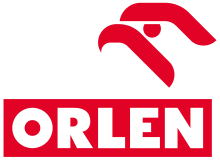PKN Orlen
From Wikipedia, the free encyclopedia
 |
|
| Type | Public company |
|---|---|
| Traded as | WSE: PKN WIG20 Component |
| Industry | Oil and Gas |
| Founded | Płock, Poland (1999) |
| Headquarters | Płock, Poland |
| Key people | Dariusz Jacek Krawiec Executive Chairman |
| Products | Fuel, crude oil and other natural gas |
| Revenue |
|
| Net income | |
| Employees | 24,113 (2007) |
| Website | www.orlen.pl |
Contents |
Establishment
The firm was created through the merger of Poland's two communist oil monopolies. PKN Orlen has its roots in the creation of C.P.N., Communist Poland's petroleum retail monopoly in 1944. In the 1950s, the second block of PKN Orlen was formed, Petrochemia Płock, a state firm in charge of the refineries in Płock and grew to become the largest complex of its kind in Poland. After the merger of CPN and Petrochemia Plock, the company was renamed into Polski Koncern Naftowy (PKN), with Orlen added several months later as the consortium's brand name. The new name is derived from Orl- for "orzeł" (Polish: eagle) and its adjective "orli", and -en for "energia" (Polish: energy).Privatization and Orlengate
Main article: Orlengate
In 1999, both firms were partially privatized and merged to create a retail and refining company under the name PKN Orlen.Orlengate is the biggest corruption scandal in the modern political history of Poland. It happened during the rule by the leftist government of the postcommunist party SLD (Sojusz Lewicy Demokratycznej, Democratic Left Alliance). Disclosed in 2004, the scandal started with the arrest on 7 February 2002 by the UOP (Office for State Protection) of Andrzej Modrzejewski, the CEO of PKN Orlen.
PKN Orlen was involved in merger talks with MOL Group, a Hungarian oil company in 2005. If merged, the two firms would have created a regional giant, and controlled much of Central Europe's oil industry. However, the planned merger failed due to high politicization. Following the dropped merger plans, PKN Orlen bought a majority stake in Czech Unipetrol. During May 2006, the company announced its largest investment ever when it took over a majority share of Lithuania's Mažeikių Nafta, the largest company in the Baltic States, from Yukos. With the completion of the takeover, PKN Orlen became Central Europe's largest company.
PKN Orlen, under a joint venture with the Netherlands firm Basell, also owns Poland's largest plastics company.
In 2007, it was ranked 432 in the Fortune Global 500 and 679 in the Forbes Global 2000 list of companies.[5][6] Orlen employs over 24,000 people in 4 countries.
Tidak ada komentar:
Posting Komentar